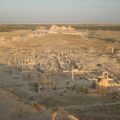Weather Democracy

Twenty-first century Americans face two seemingly separate and intractable crises, either one of which could bring the modern way of life, and perhaps many lives as well, to an end. The climate crisis has been building for a long time, fading in and out of prominence, with the prospects of a policy response alternating from remote to seemingly imminent and back again. Our democratic crisis, on the other hand, seems to have sprung up more recently. But it too has been long in the making, with the authoritarian-inclined President Trump—and his attacks on competing independent power centers central to the U.S. constitutional scheme, like the press, judiciary, and law enforcement—merely the most recent infection of an already weakened host.
Are these two crises related? Or is it just unlucky coincidence that they are occurring, and gathering force, at the same time?
One issue common to the democratic and climate crises is the way people perceive them—or don’t. An almost infinite number of related or second-order effects flow from these existential matters and compete for our attention every day—all manner of environmental problems and all kinds of republican (both small r and large R, I suppose) dysfunction. Invasive, threatened, and extinct species, disease vectors expanding their ranges, acidifying oceans, storm, drought and wildfire intensity, and changing weather patterns generally, on the environmental side; hyper-gerrymandering, resurrected voting rights restrictions, cash flooding the political system, foreign election meddling, breakdown of senatorial order, sandbagged investigations, attacks on the press as the “enemy of the people,” and failure to enact legislation on a range of topics despite broad popular backing on the democratic side. (From the abundant consequences one can customize these lists to suit.) How can anyone be expected to take, and take in, all of this? The truth is, we can’t.

The Climate Swerve: Reflections on Mind, Hope, and Survival
by Robert Jay Lifton
Hardcover, $22.95
The New Press, 2017
In his new volume, The Climate Swerve: Reflections on Mind, Hope, and Survival (The New Press, 2017), Robert Jay Lifton dubs responding to climate change the “most demanding and unique psychological task ever faced by humankind.” Lifton is one of the earliest students and investigators of the psychological response to nuclear weaponry, the mother of all existential crises—or at least the first one to force people to understand that humans could, you know, end it all. He has surveyed this landscape before.
Nuclear weapons (which Lifton discusses perhaps a bit too much in a book about climate) were universally recognized for their destructive power, and a decades-long bipartisan effort to limit their threat ultimately led to reductions in stockpiles and restrictions on testing. Climate change, by contrast, is essentially uncontrolled.
One prevalent response, Lifton writes, is “psychic numbing,” which he defines as “a diminished capacity or inclination to feel.” Once desensitization and denial become a mental habit, they aren’t likely to remain confined to a single issue, Lifton observes. Plausibly, climate change, unaddressed, is increasing our cynicism and fatalism with regard to many other issues, including the political system. Psychic numbing, and the resulting “normalization” of the previously unthinkable—a term also used by Masha Gessen in her November 2016 essay “Autocracy: Rules for Survival”—seem apt descriptors of the denial and acceptance being deployed to carry on day-to-day life in the face of multiple, constant degradations of climatic and democratic norms, any one of which in earlier times likely would have, one likes to imagine, aroused the public and led to urgent consensus on a way forward.
Few alive today can remember life without a sword of Damocles suspended over the species. Current generations have come of age with what Lifton calls “double reality”—an adaptive psychological strategy that allows one to continue business as usual in still-comfortable daily life while simultaneously harboring elsewhere in the brain awareness of awesome threat. How does living such a life change human psychology and behavior, both individual and collective? What is the impact on faith in democratic politics?
Lifton contends, hopefully, that as evidence continues to accumulate, this double reality will become increasingly untenable, and a new acceptance of the imperatives of climate change—the “climate swerve”—will take hold. Perhaps. I have often thought that behind the climate policy question—what to do—there is a gnawing, more immediate and more personal question: how do we live with this? How do we hold this terrible knowledge? I had, perhaps unrealistically, hoped to glean insight into or even instruction on that from Lifton. If we can’t find a serviceable answer, psychic numbing will always beckon, for climate science acceptors and rejecters both. Environmentalists have darkly joked, for years, that everyone is doing something about the weather, but no one is talking about it.
Still, the question remains: why are both the environmental and democratic crises confronting us at the same time?
The most straightforward view is simply that dysfunctional governance mars decision-making across the board—whether it concerns raising the debt ceiling, funding the government, responding to foreign election interference, or anything else. Climate change—both its mitigation and adaptation to it—is merely one of numerous challenges we are not dealing with effectively, if at all. Failure of collective decision-making, i.e., governance, leads to a host of ills, unchecked greenhouse gas emissions being just one of them.
The collapse of the Roman republic illustrates, of course, that democratic crisis is not unique to our age. Many of the discords that figured into the Roman slide to autocracy ring familiar in today’s United States, if one cares to listen for them. In the century before the Senate anointed Julius Caesar dictator for life in 44 BCE, disputes over “paths to citizenship,” voting rights, electoral games, and polyglot immigration roiled the late Republic. These conflicts gave fuel to civil and political violence, which filled the void left as long-standing norms of republican politics and morality receded. Human-induced global warming, though, is not a problem common to both eras. (The steam engine invented in ancient civilization never amounted to more than a curiosity and consequently did not introduce the history- and climate-changing technological revolution seen over the last 250 years.) Vast industrial-scale environmental complication did not bedevil the Romans as it does us.
Nonetheless, reading about Rome—still the best available case study of the career of a republic—is a compelling proposition today. Even if the Romans did not confront the environmental overlay that we do, rehearsing their political travails may offer some useful perspective. After all, that’s why we read history. Conversancy with Roman history, and classical education more broadly, was common among the founders of the United States, including the authors of the Federalist Papers, which is replete with examples of war, tyranny and intrigue from antiquity assumed to be familiar to contemporary readers. With the viability of constitutional government once more a pressing question, as it was at the founding, Rome again calls.

The Storm Before the Storm: The Beginning of the End of the Roman Republic
by Mike Duncan
Softcover, $15.99
Public Affairs Books, 2017
Mike Duncan had Rome and the rise of populism in mind when he decided to write The Storm Before the Storm: The Beginning of the End of the Roman Republic (Public Affairs Books, 2017). Duncan, who is not an academically credentialed classicist in the mold of, say, Mary Beard, is well known from his popular podcast series covering the span of Roman history.
In his author’s note Duncan gamely addresses the repeated question he heard from listeners that a more academic writer might hesitate to touch: Is America Rome? With the caveat that such an endeavor is “fraught with danger,” Duncan compares U.S. history to the Roman timeline. He reasonably observes that the U.S. is beyond its revolutionary phase. It is no longer in its global conquest stage, the one in which international hegemony is established—that was the Second World War and the Cold War, he says. And—despite current fears—the American republic has not yet collapsed and been replaced with a dictatorship. Accordingly, Duncan plots the U.S. in a space between the Roman wars of conquest and the rise of the Caesars.
For Duncan and other historians of the era, at the root of the late Republic’s troubles were the very successes of Roman conquest in Carthage and Corinth in 146 BCE. The wealth produced by these victories exacerbated economic inequality—“there were not in the state two thousand people who owned any property,” Duncan quotes the tribune Philippus—and drove taboo-destroying political polarization, ultimately giving openings to murderous, antidemocratic strongmen like Marius (consul a record seven times) and Sulla (leading his legions inside the city of Rome) long before Casear crossed the Rubicon.
The influx of foreign spoils and plum overseas contracts funded the elite’s acquisition of distressed farmsteads left behind by yeoman legionnaires during their extended military service. Dominant land-owning families staffed their new commercial megafarms with slaves imported in the hundreds of thousands as another perk of conquest. Reliance on imported slaves had predictable downward impacts on demand for labor. The gap between the peasantry and the plebs urbana, on one hand, and large landowners on the other, widened. The multi-generational effort to implement (and resist) reforms grew contentious to the point that the once-inviolable rules of political discourse and decisionmaking—such as judicious use of and deference to tribunal vetoes and respect for implicit consular term limits—fell by the wayside. “Without custom there could be no shame, and without shame anything became possible,” historian Tom Holland observed.
Duncan claims that “we have long been denied” the story of the final generation of the Republic, the “storm before the storm,” leading up to Julius Caesar’s ascension. Except we haven’t. Holland’s Rubicon: The Last Years of the Roman Republic (Anchor Books, 2003) treats the same period in richer detail that can allow us more vividly to see ourselves in the Roman narrative. Ancient foodies “began to seek dishes not to remove but to stimulate the appetite,” even though, according to Holland, “celebrity chefs had long been regarded as a particularly pernicious symptom of decadence.” There was extravagant personal real estate development, like the tunnels the nobleman Lucullus cut through mountains in order to deliver salt water to his personal fishponds. Romans indulged in globalization fantasies and saw themselves as benefactors of their own “manifest destiny,” Holland writes.
In a pair of chapters of her popular SPQR (Norton, 2015), Beard offers perspective and analysis that are frequently lacking in Duncan. She reports, for example, the contemporaneous view of the politician Sallust that among the ills flowing from the destruction of Carthage were an “every man for himself” ethos overtaking all sections of Roman society, as well as the breakdown of consensus among rich and poor, and the concentration of power in the hands of very few men. Beard also recalls that the last century of the Republic enjoyed a flowering of poetry, art and political analysis and innovation, suggesting that the outcome might have been different had the Romans made different choices, that the fall of the Republic was not a matter of destiny. On the other hand, the thought is chilling: Americans have prided themselves on their sophistication and innovation across many fields of endeavor, but history suggests that this may not be sufficient to resist the gravitational pull of societal decline.
Rome did not emerge from its deep divisions with its republic intact. Then, as now, intense polarization burdened the civic discourse needed for effective democratic decision-making. Today perhaps few issues are more polarized in America than climate change. The adoption of a coherent climate policy has been hampered by that polarization, and a resulting inability to debate productively, reason together, and consider the science. Yet, if we cannot make necessary decisions, not only will we fail to address climate change; our government, too, in the most basic sense—our ability to govern ourselves—will have failed as well.
Creeping rejection of our Enlightenment heritage characterizes the cognitive shift underlying both the democratic and climate crises. Rejecters of long-held constitutional norms and of climate science spurn the rationalist ideal from which democratic governance and the scientific method—both, at bottom, evidence-based systems—emerged. Call it the retreat of the Reasoning Man from the public square; we seem to be losing our appetite for good faith inquiry. Lifton’s supposition that the present “unstable truth-rejecting equilibrium” is on borrowed time can be correct only in a world that values truth. The belief that reasoned and fact-based argument can prevail is central to the prospects for climate policy and democratic governance. If instead we have arrived at an age, like the late Republic when, as Duncan writes in Storm, “a lie was not a lie if a man had the audacity to keep asserting the lie was true,” then these prospects look considerably dimmer.
If political gridlock disables both the basic mechanisms of the republic and responses to climate change, where might a solution, and solace, lie? Both crises are perhaps susceptible to the same remedy, democratic engagement, or what Lifton terms “life-enhancing activism.” The simple expedient of increasing voter participation may be enough to mitigate, if not fully stem, both crises. Throwing the bums out would simultaneously demonstrate democratic power and presumably deliver representation more inclined to act on climate.
Still, tactical voter turnout strategies can take us only so far. There is no magic cure for developing, or restoring, an informed and thoughtful citizenry amenable to discourse. After a certain point, after enough accumulated dysfunction and insults to the system, the slide from democracy may become inexorable. Perhaps, under such circumstances, addressing climate would have to await attention from a more authoritarian regime. As far back as 1974, in An Inquiry into the Human Prospect, Robert Heilbroner suggested, though he had a flawed understanding of climate change, that authoritarian government might prove necessary to address environmental problems. One struggles to avoid this conclusion. But unless the democratic system proves itself capable of rising to this challenge, we will either fail to address the climate crisis altogether, or something else will fill the void. China, which already dominates solar panel manufacturing, races toward electric vehicles while the highest levels of the U.S. Government dally with inattention and denialist fantasies.
2018 presents an important test of whether enough citizens remain willing to put their energies and trust in the democratic form of governance and choose a “life-enhancing activism” that can rescue the republic and vindicate climate policy. Or will people prove to have moved on, to be in some sense already looking beyond democratic governance as we knew it? These questions, posed to each of us, can only be answered together.
About Andrew Ratzkin
Andrew Ratzkin is an environmental and energy sector lawyer who has written extensively on climate change and other policy topics, with work appearing repeatedly in Crane’s New York Business, and with major articles in, most recently, Environmental Law in New York and the Columbia Journal of Environmental Law as well as USA Today, Washington Monthly, The New York Times, The Christian Science Monitor, The Wall Street Journal, and The Washington Post.





